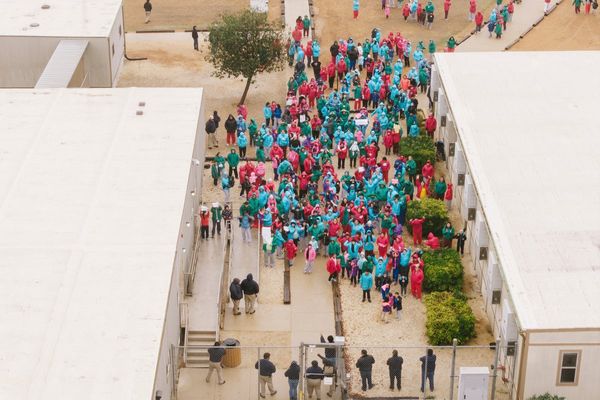
In 2011, NSW paid PwC $256,709 to help slim down and decentralise the Health Department. Since then, Crikey can reveal, the firm has raked in nearly $30 million from NSW Health — the lion’s share of the $123 million the state’s so-called local health districts (LHDs) have paid for consultancy services in the past 12 years.
The runner-up, KPMG, which also helped advise the government on the 2011 restructure, doesn’t come close with its roughly $5.5 million earned, according to numbers crunched by the chair of a NSW parliamentary inquiry and obtained by Crikey.
PwC made more than that ($6 million) in payments from a single LHD, whose board featured PwC’s acting chief executive Kristin Stubbins as one of its members, and whose chief financial officer was being “mentored” by her.
“We’ve created a system that is reliant on consulting, and it was done deliberately,” NSW Greens upper house MP Abigail Boyd told Crikey. Boyd chairs an ongoing inquiry into the state’s use of consulting services and has so far focused on the Health Department’s reliance on the big four and other firms.
She said the inquiry began looking at LHDs because they aren’t required to report consultancy spending in annual reports, unlike many other government entities.
“Despite health accounting for around a third of our total budget expenses, it is inexplicably exempted from key reporting and oversight requirements,” Boyd said.
“With financial decision-making largely resting at LHD board level, and with many of the directors of those boards being consultants and ex-consultants, is it any wonder that the big four consulting firms have been treating NSW Health as a cash cow?”
Boyd said the restructuring had turned NSW Health into a “consultant’s playground”.
Crikey does not suggest any of the individuals mentioned in this article are accused of wrongdoing, misusing their position or having a conflict of interest.
Consultants brought in to advise on restructure
In 2011, the Coalition took power in NSW after 16 years in opposition. That year, the state’s director-general of health, Mary Foley, reformed NSW Health, slashing 150 jobs by abolishing a layer of middle management and giving greater autonomy to LHDs.
Foley was picked by then-Liberal state health minister Jillian Skinner just one day after Skinner was sworn in. Before that, Foley worked for several years at PwC as national health practice leader.
Foley told the inquiry that while she “fully [agreed] the use of consultants by governments is a legitimate area for scrutiny and review”, she had worked for PwC for only two and a half years and was never a partner.
Upon joining NSW Health, she “was careful to declare possible conflicts and to be advised on how any potential conflicts should be managed in accord with government guidelines”. She also clarified to the inquiry that her restructure report was “not the source of the recommendations for devolved governance to local health districts”.
“The report is my exercise of my duties at the time as agency head to advise the government of the day on the implementation of its policies,” Foley said.
Around the same time, NSW Treasury hired PwC to consult on the Health Department restructure. PwC’s report, which cost taxpayers $256,709, was delivered in January 2012 and featured advice on how to reconfigure local health districts, among other “identified opportunities relating to NSW Health revenue”.
The report was referred to by Boyd in a hearing on June 15. Boyd asked NSW Health deputy secretary for people, culture and governance Phil Minns: “Did health ever think that that would lead to potential conflicts of interest or a situation where the resulting structure might lead these boards to become reliant on external consultants?”
Minns replied: “I’m sorry, chair, I cannot comment. The only point I’d make is that if you were to talk to the chairs of our boards, I don’t think they would describe themselves as being reliant on external consultants.”
PwC was far from the only consultancy firm to take part in designing the NSW Health restructure. Treasury’s 2011-12 annual report shows:
- KPMG advised the government on “existing and new revenue improvement opportunities and issues in NSW Health” at a cost of $403,139. It also prepared expert advice on how to “address clinical variations in NSW hospitals” at a cost of $130,000. It ended up earning $5,559,879 from LHD contracts in the following 12 years;
- Ernst & Young advised the government on how to “identify and evaluate workforce improvement opportunities in NSW Health in both clinical and medical areas” at a cost of $908,636. It also reviewed “benchmarking processes and tools in NSW Health to validate appropriateness of ongoing benchmarking to measure cost drivers” at a cost of $493,550. It earned $4,612,513 from LHD contracts in the following 12 years;
- The Boston Consulting Group helped design and develop “implementation processes and reporting frameworks’ capability to enable the delivery of recommendations from the NSW Health review and other future reviews” at a cost of $499,540. The firm appears to have done little if any work for the LHDs in the years that followed.
Second-biggest spender has links to PwC
The LHD that spent the most money on PwC contracts since 2011 was Western Sydney LHD, which paid the firm $16,528,054 for 32 contracts. That included a single $6,989,922 payment for supporting the Qudos Bank Arena vaccination centre during the COVID-19 crisis. That board has no known connections to PwC.
The second-biggest spender was the South Eastern Sydney LHD, where Stubbins was a board member for years, as well as a “mentor” to the chief financial officer.
Stubbins was on the board from February 2013 to August 2015. Between the 2012-13 and 2014-15 financial years, the South Eastern Sydney LHD signed contracts worth $2.7 million with PwC.
Stubbins told the inquiry last month she had always acted with the utmost integrity: “This included recusing myself and stepping down where appropriate.” She said her mentoring role “involved very high-level discussions around the role of a CFO and certain strategic matters” and had “nothing to do with the PwC work”. All of her contributions to the LHD board were unpaid.
There are other connections between the South Eastern Sydney LHD board and PwC. The board’s finance and performance committee chair since January 2015, Jonathan Doy, was a partner at PwC between 2000 and 2011 and told the inquiry he still receives a pension from his old firm.
Michael Still, the chair of the South Eastern Sydney LHD board, told the inquiry the health districts could learn a lot from the consultants on the boards: “In my view, Kristin Stubbins was invaluable to the South East Sydney board. Other chairs have told me about the value that some of these consultants have brought.”
Aim for health services to be ‘funded nationally, run locally’
In the years before the 2011 restructure, health reforms were ongoing across Australia, with many aimed at giving more local and community input into the system. In 2007, Kevin Rudd’s federal Labor government promised “the single biggest health reform in a quarter of a century”. The Medical Journal of Australia wrote about Rudd’s reform plan, released three years later: “The essence of the reform is evident from its catchcry, ‘funded nationally, run locally’.”
In NSW, a 2008 special commission of inquiry known as the Garling inquiry, which came in response to some high-profile failures by the state’s hospitals, had recommended broad reform, including repairing a “breakdown of good working relations between clinicians and management” by “devolving more power from the area chief executive to local managers”.
The state’s Labor government, before losing power in 2011, established the LHDs and the boards governing them, but the Coalition government that took over year gave the LHDs far greater responsibilities.
Foley, who had worked in senior roles for the federal public service, NSW Health and non-profit hospitals before joining PwC in 2008, was responsible for implementing the new government’s restructure policy.
She sought to remove a layer of management between the department and the LHDs to “flatten the organisational structure and bring decision-making closer to the patient”, and acknowledged in her report this would require the LHDs to have “a broad range and depth of skills and expertise around the boardroom table”.
Skinner, too, noted the boards would be likely to need to fill “skill gaps” in the “financial governance and legal areas”, telling Parliament in 2011: “I look forward to my conversation with chairs of the current networks and others in those local communities to make sure that we have the right skills on those boards.”
Australian National University honorary professor of public policy Andrew Podger said the reforms brought in by Foley were “very sensible” and helped fix a health system that had previously been too centralised and politicised.
“It moved the system in the right direction, to a more professional management of health services in NSW,” he told Crikey.
Third of consultancy spending went to big four
Integrity advocate and barrister Geoffrey Watson SC said the spending figures since 2011 showed how PwC “has managed to intertwine itself with government”.
“They’re doing it for reasons that are undoubtedly good private commercial reasons: more profits for PwC. You have an inherent conflict of interest, with the decision-maker having loyalties divided between its own interest and the public interest,” Watson told Crikey.
As Crikey has reported, consultants from the big four firms are represented on numerous government boards, federally and locally. PwC has told the NSW inquiry that 660 of its partners sit on various government and non-profit boards.
“There’s a very difficult issue which arises from the fact that a number of the PwC people in these governmental positions either retain their PwC appointment, or in some instances are on a PwC pension, which obviously is depending on the ongoing profitability of PwC,” Watson said. “If PwC isn’t making money, pensions aren’t going to be paid. It’s as simple as that.”
The NSW auditor-general reported in March that NSW government agencies disclosed $1 billion in spending on consultants between 2017 and 2022. A third of that went to the big four firms — PwC, KPMG, Deloitte and EY.
Crikey sent a list of questions to PwC, including about Stubbins’ board seat, but the firm said it had a policy of not commenting on client matters on the record. NSW Health also declined to comment. The South Eastern Sydney LHD did not respond to questions from Crikey other than to say it was cooperating with the inquiry.







